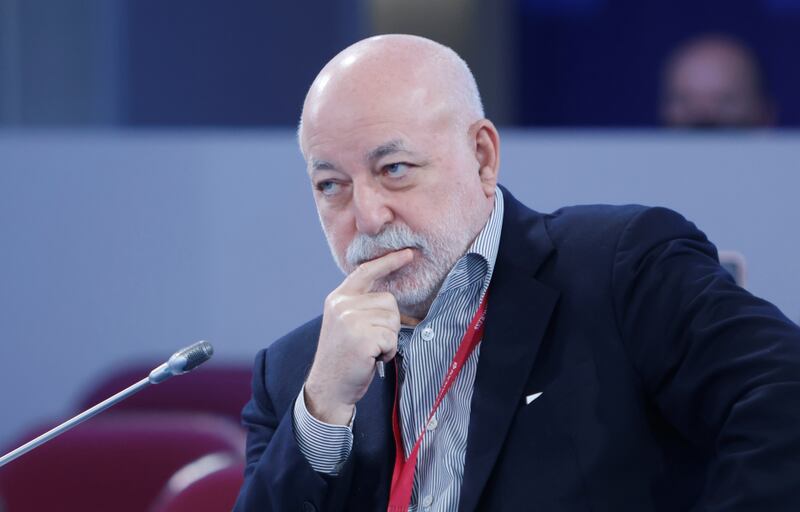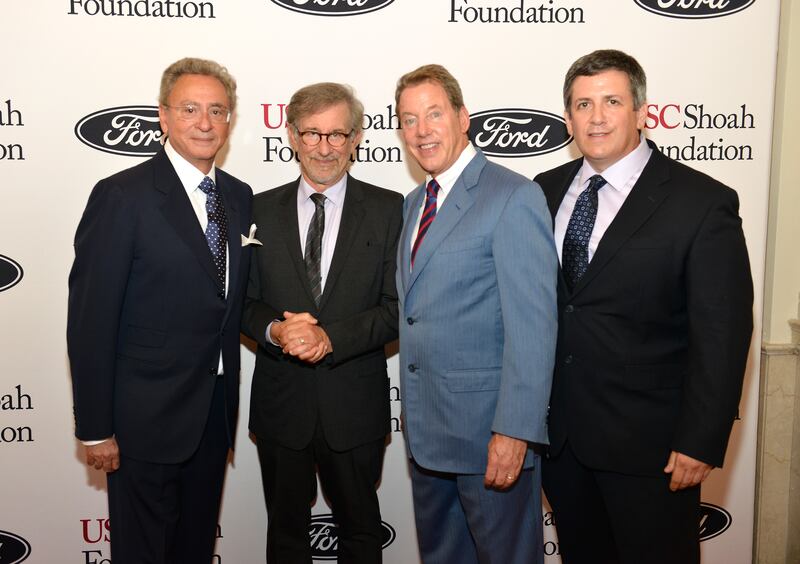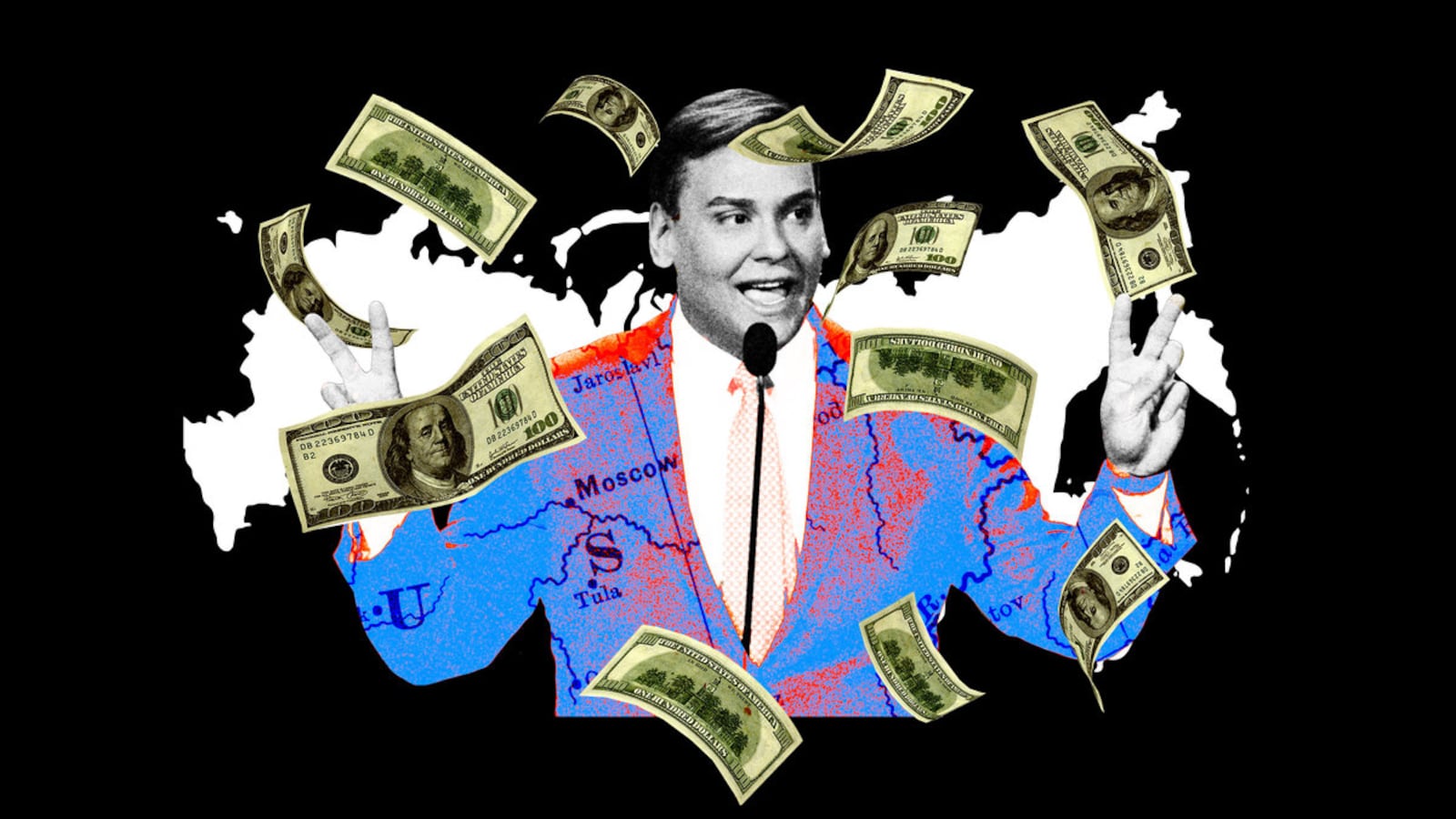The cousin and cash handler for one of Russia’s most notorious oligarchs poured tens of thousands of dollars into electing a newly minted congressman-elect who called Ukraine’s government “a totalitarian regime.”
Republican George Devolder-Santos vanquished Democrat Robert Zimmerman this month in the race for a House seat covering parts of Long Island and the New York City borough of Queens—riding a red wave that swept the Empire State this cycle, and washing away two decades of Democratic dominance in the district.
Devolder-Santos had long courted conservative media attention by presenting himself as a “walking, living, breathing contradiction”—a gay Latino millennial born in New York City, who is also a fervent devotee of ex-President Donald Trump.
For much of his professional career, which included a stint as regional director at an alleged Ponzi scheme, the Republican used the name George Devolder. However, as he ventured further into the world of politics, he began to increasingly use the name George Devolder-Santos or simply George Santos.

George Devolder-Santos (left) received tens of thousands of dollars from Andrew Intrater (right), who is cousins with Viktor Vekselberg, one of Putin’s wealthiest and most influential courtiers.
Photo Illustrations by Luis G. Rendon/The Daily Beast/GettyHe stood out to the Washington Post earlier this year for his remarks in the aftermath of Russia’s bloody, unprovoked assault on Ukraine.
“It’s not like Ukraine is a great democracy. It’s a totalitarian regime. They’re not a great bastion of freedom,” the congressman-to-be told the paper.
He has insisted that Ukraine “welcomed the Russians into their provinces”—an apparent reference to President Vladimir Putin’s 2014 invasion to prop up rogue separatist parties—and that Ukrainians in the east “feel more Russian than Ukrainian,” even though every single Ukrainian province overwhelmingly voted for independence in 1991.
It was not the first time Devolder-Santos had parroted Kremlin talking points. In the weeks before Putin’s brutal, blundering attack upon his western neighbor, the candidate repeatedly took to Twitter to accuse President Joe Biden of plotting to “start a war” with Russia and deploy American troops to Ukraine.
But unreported until now is that by the time Devolder-Santos made these statements, his congressional ambitions had already received a $32,800 boost from a controversial figure linked to the uppermost echelons of the Russian regime—and that support would more than double in size during the months ahead.
The cash came from Andrew Intrater and his wife, who variously listed her occupation as “homemaker” and “analyst” for Falcon AI, one of her husband’s subsidiary firms.
Intrater’s main venture is today called Sparrow Capital, but it previously used the name Columbus Nova—and its primary function has long been to manage the investments of Intrater’s cousin, Viktor Vekselberg, one of Putin’s wealthiest and most influential courtiers.

Russian businessman Viktor Vekselberg.
Maxim ShemetovSo tightly intertwined is Intrater’s business with that of his relative, who snatched up swaths of Russia’s aluminum and fuel industries during the post-Soviet period, that Columbus Nova described itself in 2007 Securities and Exchange Commission filings as “the U.S.-based affiliate” of Vekselberg’s Renova Group. In fact, SEC records show that “Columbus Nova” was merely a trade name, and the company was in fact incorporated as Renova U.S. Management LLC until it rechristened itself Sparrow Capital in 2018.
The rebrand came just months after the Department of the Treasury froze almost all of the company’s assets for its tight ties to the heavily sanctioned Vekselberg. The following year, Intrater became a national figure when it surfaced that his firm had paid half a million dollars to longtime Trump fixer Michael Cohen, and the pair had exchanged hundreds of phone calls and text messages during the 2016 campaign.
Intrater sued the federal government in hopes of regaining access to his fortune, but a judge slapped the effort down in 2020. However, the businessman persisted and ultimately reached what court records refer to as an “administrative agreement” regarding at least part of the corporate accounts in late 2021. However, the case file does not include this document, and Intrater’s team did not respond to repeated requests for comment.
Intrater’s support for Devolder-Santos dates to the GOP pol’s first failed bid for Congress in 2020, which got a $11,600 cash infusion from the financier and his bride, reflecting the maximum contribution amount then allowed.
But after that initial defeat federal donation limits would prove a small obstacle. Starting in March 2021, Intrater and his wife began pouring tens of thousands of dollars into auxiliary committees backing Devolder-Santos: $20,000 directly to GADS PAC, a leadership political action committee bearing the candidate’s initials, plus $12,100 to Devolder Santos Nassau Victory, a joint fundraising committee formed with the Nassau County Republican Party. Devolder Santos Nassau Victory had to drop $10,000 of that gift into the Nassau GOP’s federal account—but that account made just two federal expenditures this cycle, the larger of them by far being the purchase of lawn signs supporting Devolder-Santos.

Andrew Intrater, right, is seen with (from left) Mickey Shapiro, director Steven Spielberg, and William Clay Ford, Jr.
Duane Prokop/Getty ImagesAll this came on top of $12,400 Intrater and Pentinen gave the Devolder-Santos for Congress committee.
The individual who answered a phone associated with Devolder-Santos identified himself to The Daily Beast as his campaign coordinator, but declined to share his name. He would not speak directly about the Intrater gifts, but insisted that the national Republican Party had set the candidate up with most of his large contributors.
But Devolder-Santos was far and away the largest beneficiary of Intrater’s largesse this year. Further, Devolder-Santos’s committees are the only ones that received gifts from Intrater’s wife this cycle.
The campaign coordinator directed The Daily Beast to forward all questions to a press email, but messages sent to the address provided received no reply.
Shortly after the Russian onslaught against Ukraine began, and public opinion swung toward Kyiv, Devolder-Santos appeared to soften his stance on the country. In a Fox News interview, he highlighted that his grandfather was born in the Ukrainian capital, and on Twitter he has urged prayers for the country.
However, he seems to have avoided the topic since late February, and it is unclear at this point whether he will join the anti-Ukraine faction within the narrow GOP majority in seeking to sever aid to the embattled nation.






